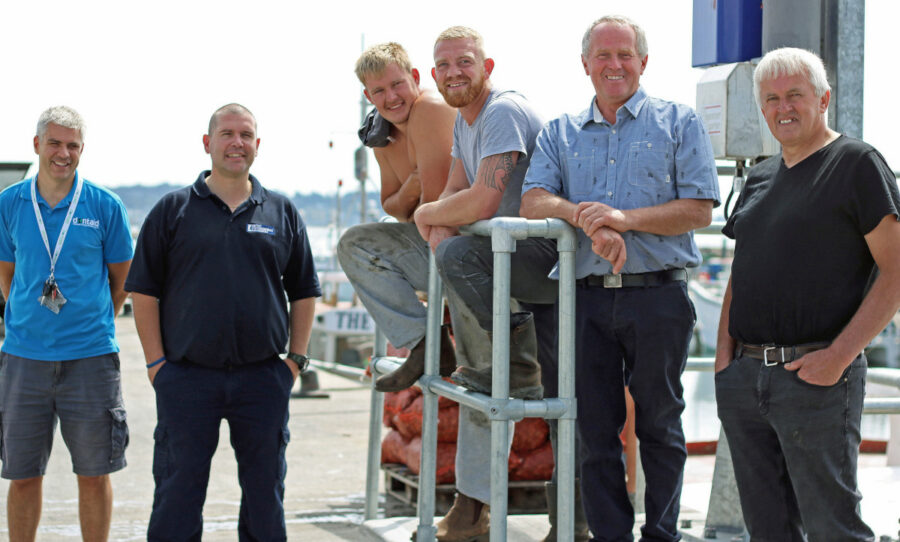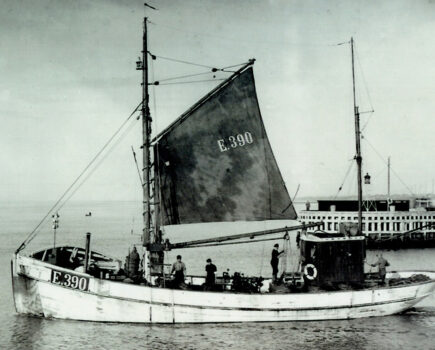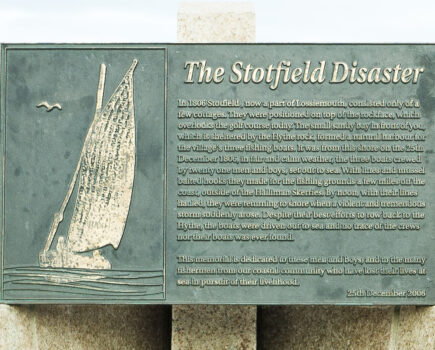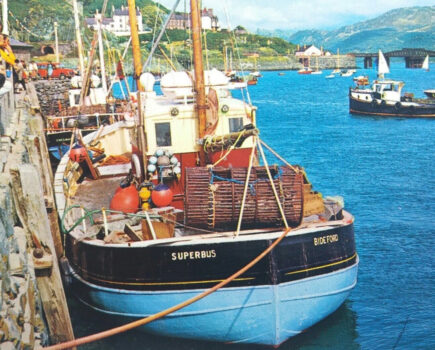With its 140th anniversary approaching, the role of the Fishermen’s Mission is evolving – but it remains as essential as ever. John Periam reports
The Fishermen’s Mission was founded by Ebenezer Joseph Mather in 1881, as the National Mission for Deep Sea Fishermen. He was concerned by the poor working conditions fishermen had to endure, often resulting in hardship back onshore, and felt that something had to be done to alleviate their troubles, while offering pastoral support. Despite safety and welfare advances in the intervening 139 years, fishing remains the most dangerous occupation in the UK.
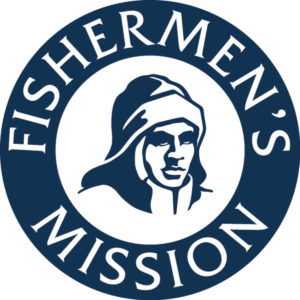 The Mission operates through a team of superintendents based all around the UK, who are there to help in time of need. They make a concerted effort to connect with as many fishermen as possible, including even single-handed beach fishermen. By visiting ports and meeting fishing communities, it is surprising what information one can pick up about a fisherman or family who may need some support. It is a known fact that fishermen are proud people, and prefer to keep things to themselves. At times, this results in some of the superintendents having to do some undercover research.
The Mission operates through a team of superintendents based all around the UK, who are there to help in time of need. They make a concerted effort to connect with as many fishermen as possible, including even single-handed beach fishermen. By visiting ports and meeting fishing communities, it is surprising what information one can pick up about a fisherman or family who may need some support. It is a known fact that fishermen are proud people, and prefer to keep things to themselves. At times, this results in some of the superintendents having to do some undercover research.
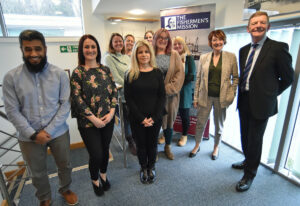
The team at the Fishermen’s Mission HQ in Whitley, Hampshire.
The Fishermen’s Mission has 70 full- and part-time staff, with a core staff of around 13 at its headquarters at Whitley in Hampshire. Around the ports, it enjoys the support of many volunteers and donors, who are vital to the success of its work. There are fresh challenges ahead, so the charity is taking on three new team members to manage its three specific regions and assist and guide all involved in times of need.
Alison (Ali) Godfrey, the Mission’s director of business development, said: “Fundraising has changed a great deal, and this is having a diverse effect on how charities work. The Fishermen’s Mission is the only charity dedicated to working with those in the fishing industry, as well as being a member of the Christian Maritime Association. We have no government grants or outside income support, other than what our volunteers do linked to fundraising.
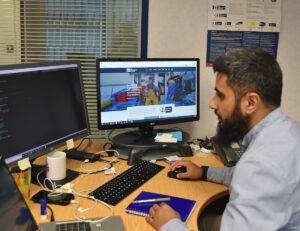
Hashim Alyas is in charge of the development of digital networks, which are becoming the Mission’s main means of communication.
“As a result, we have to move with the times, and we now have onboard Hashim Alyas, who is our digital manager. Fishermen like to communicate by text, and use Facebook a lot. Hashim is expanding these links for us, and most important of all, updating our website on a regular basis. Communication is what it is all about, and gone are the days of our superintendents using notebooks. They now have iPads and mobile links direct to our headquarters in-house team, so they can resolve issues a lot faster. Hashim has worked very hard in updating our communication links, which will play a key role this year.”
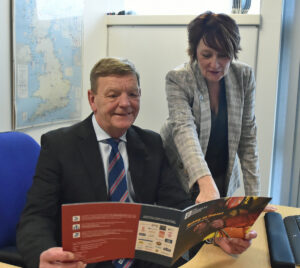
David Dickens CBE RN, chief executive of the Fishermen’s Mission, with Ali Godfrey, director of business development.
Over the years, the need for traditional large Mission meeting centres has disappeared, although the charity still retains eight smaller centres, which give many fishermen the opportunity to get off the boat, keep warm, meet people, do some laundry and get free Wi-Fi access. This is ideal for migrant crews, who are often away from home for long periods. The Mission can give them pastoral and practical support when needed, such as help with understanding UK law and administrative systems.
The charity’s chief executive, David Dickens CBE RN, joined in 2011, after 38 years in the Royal Navy, of which 10 were served as a submariner. “It was very much a learning curve for me, and one of the first things I discovered was that you need to be able to talk to fishermen on their own level. It is all about trust and respect for each other.
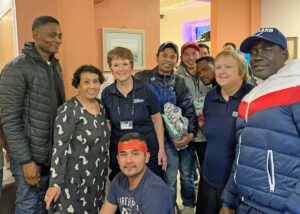
Christmas celebrations at the Troon Mission centre for visiting fishermen and those with no family connections.
“After so many years in the Royal Navy, I felt it was time I gave something back to the sea, and that was what was so appealing about this position. It wasn’t about rank; it was about being able to help others when the need arose. At the time I joined, there was a programme called Outreach, which was a way of expanding our work to meet those who knew little about us. We had Mission centres in some ports, but a lot of the time we were waiting for others to visit us. We needed to get out to meet them, and this is what Outreach is all about – to this day.
“It remains the core of our work, with staff talking to fishermen. Our aim is to ensure that people know the range of services we can provide or facilitate, and that they have the confidence to seek our assistance when times get tough. It is amazing how many in our fishing communities don’t know what we can do!”
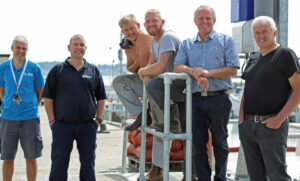
The outdoor dentist’s waiting room, as fishermen queue up for free treatment during a SeaFit visit to Poole.
Ideally, the Mission would know every fisherman and every family, and that is where Outreach is so important. It is a case of developing trust between both parties – within the fishing industry, ‘trust’ is often top of the list – and making sure that information about the Mission’s work is communicated to everyone in the industry. “I must congratulate the Fishing News team for the excellent support they have given the Fishermen’s Mission over the years,” David Dickens said.
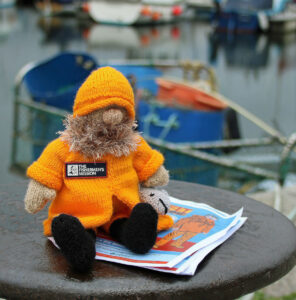
Fishermen’s Mission mascot Little Albert visits Plymouth to help raise funds.
He continued: “From the Mission’s perspective, the addition of ILO 188, codifying welfare conditions, contracts and other terms and conditions for fishermen, is very welcome indeed. We are already seeing positive outcomes as the MCA surveyors conduct their checks under the new legislation. It gives the superintendents the opportunity to judge genuine welfare concerns, and to engage with the right agencies, such as Border Force, the Gangmasters and Labour Abuse Authority, and HMRC. It seems to me that the human aspects of being a fisherman are likely to come under increased scrutiny. To this I must add our shared concerns relating to safety at sea – the unwelcome knock on the door to advise a loved one of a loss at sea is something the charity is well aware of.”

Operations manager Mary Barber is the key link between the superintendents and Mission headquarters.
There are worries, however, that this new legislation will stretch the resources of some U10s. Unless access to fishing opportunities is increased, they may have to hang up their nets. Finance has always been an issue for fishermen, due to many being self-employed. The Mission has seen an increase in the need for financial assistance, with its staff applying for 20% more grants on behalf of clients last year than in 2018. Lack of fishing, debt, serious injury and ill health were the most common reasons for fishermen suffering financial difficulties.
David Dickens added: “We are considering a financial version of SeaFit, providing advice on both business and domestic finances at the quayside. This will include advice on pensions, paying stamps, investing for the future, and the pros and cons of equity release. Sadly, financial planning is often bottom of the list while working, and it is not until retirement that many find that they do not have enough to live on.
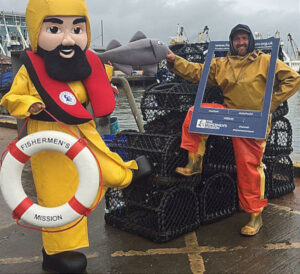
National Fish and Chip Day is a very popular Mission fundraising event, when Albert meets his supporters around the UK.
“The SeaFit programme has shown the value of working with other groups and agencies to improve welfare and wellbeing services to our fishing communities. The current programme has involved a wide range of providers, from national charities like Macmillan Cancer Support and Prostate Cancer UK to local opticians and mental health specialists.” SeaFit is a joint initiative by the Fishermen’s Mission and the Seafarers’ Hospital Society, funded by Seafarers UK, to deliver improvements to the health and wellbeing of fishermen and their families around the UK.
The Mission’s work has now extended to aquaculture, with an increasing number of former fishermen working in this field, especially in Scotland and more recently in the Republic of Ireland. With the support of Mission staff in Northern Ireland, it has assisted some fishermen south of the border, while conducting occasional visits to the main fishing ports.
Mary Barber is the Mission’s operations manager, and is now in her fourth year with the charity, providing support to all its remote staff and fundraisers. “If one of the superintendents has a particular issue, they will contact me and I will guide them in the right direction. At the moment, we are seeing an increase in the complexity of cases – for example, the weather this winter has compounded hardships for the U10 fleet. We make sure that we are seen where we are needed, under the Outreach banner. Communication is so important in my role.”
Sophie Davies is the trust and legacy manager. “My role is divided in two halves; one is managing legacy income. We monitor our income on a regular basis, and support this with literature. With so many charities out there now, we do need to keep ahead of things. We get a lot of our income from grant-giving trusts, but due to so much competition, we need to keep ahead of the situation. It involves a lot of research, and discussions with solicitors relating to specific clients.”
Next year sees the 140th anniversary of the Fishermen’s Mission, and plans are already being made to celebrate this. David Dickens said: “In terms of demand for our services, over the next five to 10 years there will be a pretty dramatic reduction in the number of older fishermen and dependents we support, especially in former major fishing ports such as Aberdeen, Hull, Grimsby, Lowestoft and Fleetwood.
“On the active front, the answer is that it all depends! Either the new post-Brexit world will see an increase in boats and crews – or it won’t. In terms of people needing our help, unsurprisingly, it is U10 crew – UK and migrant – that most often have welfare needs.
“The Mission aims to respond to developments in the industry and wider society. For example, over the last few years, reductions in social welfare care and local government budgets have increased the number and complexity of welfare cases that staff have dealt with. Outreach, and projects and programmes around wellbeing, will remain core to achieving our aim of improving and expanding the support we provide – while increasing collaboration is a must.
“In my perfect world, we would know every fisherman in and around the British Isles and they would know us – and know about all the various ways we can help when the going gets tough!”
Paul’s story
Fishing 50 miles offshore, Paul had thrown a rope over to his partner boat, when unexpectedly, the rope snagged around his leg and jerked him upwards. As he was hanging upside down, the rope suddenly tightened and snapped his right leg. Quick thinking by fellow deckhand Charlie saved his life. He untangled Paul from the rope and applied a makeshift tourniquet while waiting for the rescue helicopter.
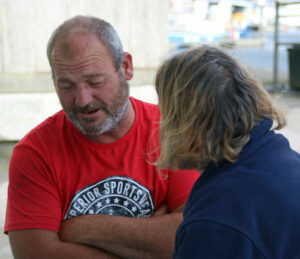
An advice session during a SeaFit event at Poole.
Surgeons tried valiantly to save Paul’s leg, but the damage was so extensive that there was no option but to amputate above the knee. Sadly, this left Paul in a wheelchair in hospital for months, trying to come to terms with life as an amputee.
Not only were there the psychological repercussions of the accident to deal with, but the financial ones too. Paul had been the main breadwinner, so when he was unable to work, the family was left with very little income and not enough to pay rent and bills.
Steve, the Mission’s local area officer, provided practical and emotional support to Paul and his family, all the way from the immediate horror of the accident, and through the long months of recovery and adaption to life with a disability. Steve helped Paul to apply for disability allowance, access counselling services and manage household budgeting, and supported the family through adaptations to Paul’s home to maximise his independence.
Today, nearly three years on from the accident, Paul is more mobile, with a sophisticated prosthetic leg, and is able to drive again, although he is no longer working as a fisherman. Mission area officer Steve remains in regular touch with Paul, providing emotional and practical support as needed, as well as supporting Paul’s parents, Andrew and Kathleen, through financial and family issues.
Paul said: “This is one of the worst things that could possibly have happened to me. My whole family have suffered. I don’t know what we would have done without Steve’s support.” Rest assured, the Mission will continue to be there for all the family for as long as it is needed.
Mark’s story
Mark lives in Portsmouth with his partner Laura and two children. He has been a fisherman for eight years, working for a local company on a self-employed basis dredging for mussels and clams, and has also picked up considerable experience scalloping, trawling, and longlining for bass.
From 2011 to 2015 he was also an RNLI volunteer, part of the lifeboat crew, and as a result has seen his share of drama and danger at sea.
Mark doesn’t own his own boat, and like many self-employed people, sometimes struggles with an erratic income. However, his first contact with the Fishermen’s Mission came about when he started looking for help for a young deckhand he worked with, who was experiencing mental health issues and was on the verge of being evicted from his home.
It was not long after this that Mark and Laura started to experience their own financial hardships. Increased regulation of local fishing grounds and restrictions on catch species left Mark struggling to generate an income. Each time he started to make progress, there would be a problem with the boat, or an accident at work that would send him backwards again.
For 18 months, Mark would regularly work long hours for next to nothing, and feeling they had nowhere to turn, he and Laura decided to contact the Fishermen’s Mission for help.
Nick, the Mission superintendent for the south coast Outreach programme, was soon on the case. He supported Mark and his family for three months in person, and via telephone calls on a regular basis. “I helped them address their rent and bill arrears by facilitating a grant which would prevent the family from having to face the devastating crisis of being made homeless. At the same time, I provided emotional and pastoral support to them as they struggled with the stress of their current situation.”
Time is a great healer, and Mark is now working for a new company, fishing all around the UK coastline, developing his fishing career through training, while enjoying life again and spending time with his family in a more relaxed state of mind.
 Mark said: “The Fishermen’s Mission picked us up at the lowest point of our lives and relationship. We are now a happy stable family, moving on, enjoying fresh challenges. We no longer see the charity as an organisation, but thanks to Nick’s help and support, we see it as a friend that helped us through one of the darkest times of our lives.”
Mark said: “The Fishermen’s Mission picked us up at the lowest point of our lives and relationship. We are now a happy stable family, moving on, enjoying fresh challenges. We no longer see the charity as an organisation, but thanks to Nick’s help and support, we see it as a friend that helped us through one of the darkest times of our lives.”

